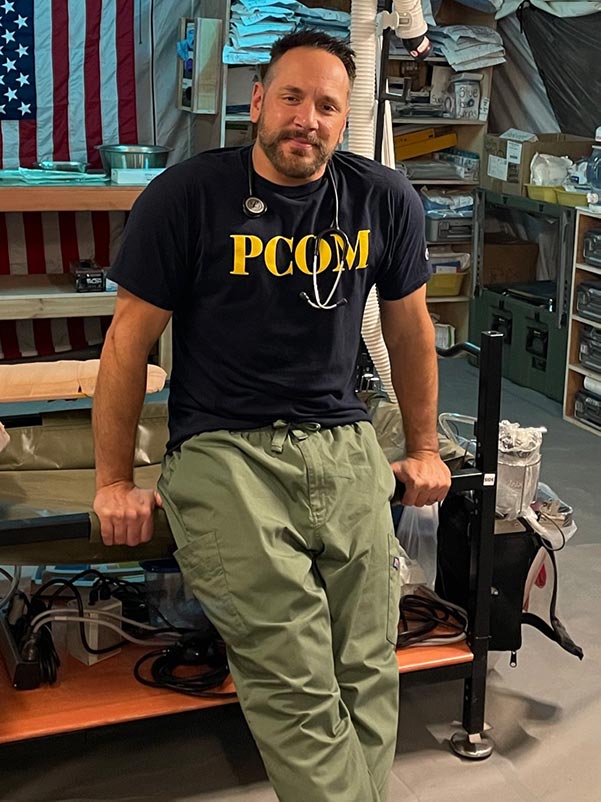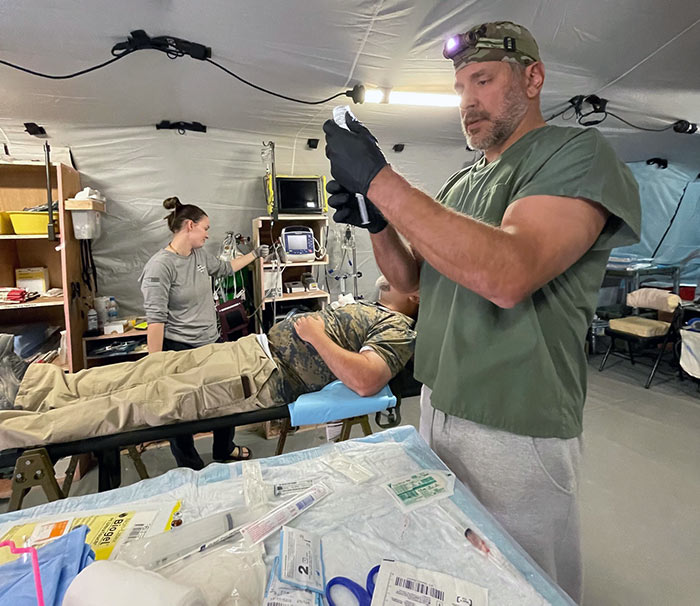PCOM Professor Trains Medics in Syria
February 3, 2022“I was probably being a bit naive, but I never worried much about impending threats
or doom.”
Robert Bassett, DO ‘06, FAAEM, FACEP, FACMT, clinical assistant professor in the Department of Emergency Medicine at Philadelphia College of Osteopathic Medicine (PCOM) and a lieutenant colonel in the U.S. Army Reserves, shared these feelings as he reflected
on his recent station overseas. He had been in combat zones before, completing a tour
in Iraq as part of Operation Iraqi Freedom and receiving several Army Commendation
medals.
His latest deployment at a small combat outpost in Syria was a three month tour as
part of a FRST, or forward resuscitative surgical team. At the time of his deployment
in fall 2021, the region was experiencing relative calm with very little kinetic activity,
or active combat, providing an opportunity to more closely engage with the local community.
Accompanying U.S. Infantry units and the Syrian Democratic Forces (SDF) on routine
patrols, Dr. Bassett’s team would provide basic medical care to the local communities
outside the base. “Partnering with the infantry helps support efforts to engage with
the local communities,” said Dr. Bassett. “People develop trust when they’re being
examined by a doctor.”
The team was approached with everything from back aches and burns to kidney stones,
though orders and logistical challenges limited the type and scope of care they could
provide. Many of the conditions they saw couldn’t be quickly remedied or treated with
basic care. “It can be hard to effect long term change, especially at the population
level,” said Dr. Bassett. “But even minimal basic care can ease suffering and engender
goodwill.”
Aiding Bassett and his team in their efforts, however, was equipment on loan from
PCOM. “The equipment we used helped train both American medics and soldiers from the
SDF,” said Bassett. “PCOM, and specifically the Department of Emergency Medicine, generously provided simulation training equipment that was instrumental in enhancing
the readiness and confidence of U.S. military medics as well as our SDF partners.”
Osteopathic medicine has deep roots in the military, and Bassett is grateful for the support he has received
from both the College and the close knit military community on campus. “PCOM’s staunch
and steadfast commitment to military medicine is an enduring source of pride for me
as both faculty and an alum.”
Though he is glad to now be back home, Bassett has pride in the work he did in Syria,
“It was a daily reminder of the impact of conflict,” he said. “Working closely with
the local populace dispels the anonymity and stigma that are often associated with
opposing forces. You can't help but be reminded of the commonality in the human condition
that transcends race, ethnicity, and most certainly geography.”
About Philadelphia College of Osteopathic Medicine
Established in 1899, Philadelphia College of Osteopathic Medicine (PCOM) has trained
thousands of highly competent, caring physicians, health practitioners and behavioral
scientists who practice a “whole person” approach to care—treating people, not just
symptoms. PCOM, a private, not-for-profit accredited institution of higher education,
operates three campuses (PCOM, PCOM Georgia and PCOM South Georgia) and offers doctoral degrees in clinical psychology, educational psychology, osteopathic
medicine, pharmacy, physical therapy, and school psychology. The college also offers
graduate degrees in applied behavior analysis, applied positive psychology, biomedical
sciences, forensic medicine, medical laboratory science, mental health counseling,
physician assistant studies, and school psychology. PCOM students learn the importance
of health promotion, research, education and service to the community. Through its
community-based Healthcare Centers, PCOM provides care to medically underserved populations.
For more information, visit pcom.edu or call 215-871-6100.
Contact Us
For general media inquiries, please contact the Office of Marketing and Communications
at 215-871-6300 or communications@pcom.edu. Visit our media relations page to view contact information for public relations personnel.
Connect with PCOM

 “I was probably being a bit naive, but I never worried much about impending threats
or doom.”
“I was probably being a bit naive, but I never worried much about impending threats
or doom.” Accompanying U.S. Infantry units and the Syrian Democratic Forces (SDF) on routine
patrols, Dr. Bassett’s team would provide basic medical care to the local communities
outside the base. “Partnering with the infantry helps support efforts to engage with
the local communities,” said Dr. Bassett. “People develop trust when they’re being
examined by a doctor.”
Accompanying U.S. Infantry units and the Syrian Democratic Forces (SDF) on routine
patrols, Dr. Bassett’s team would provide basic medical care to the local communities
outside the base. “Partnering with the infantry helps support efforts to engage with
the local communities,” said Dr. Bassett. “People develop trust when they’re being
examined by a doctor.”